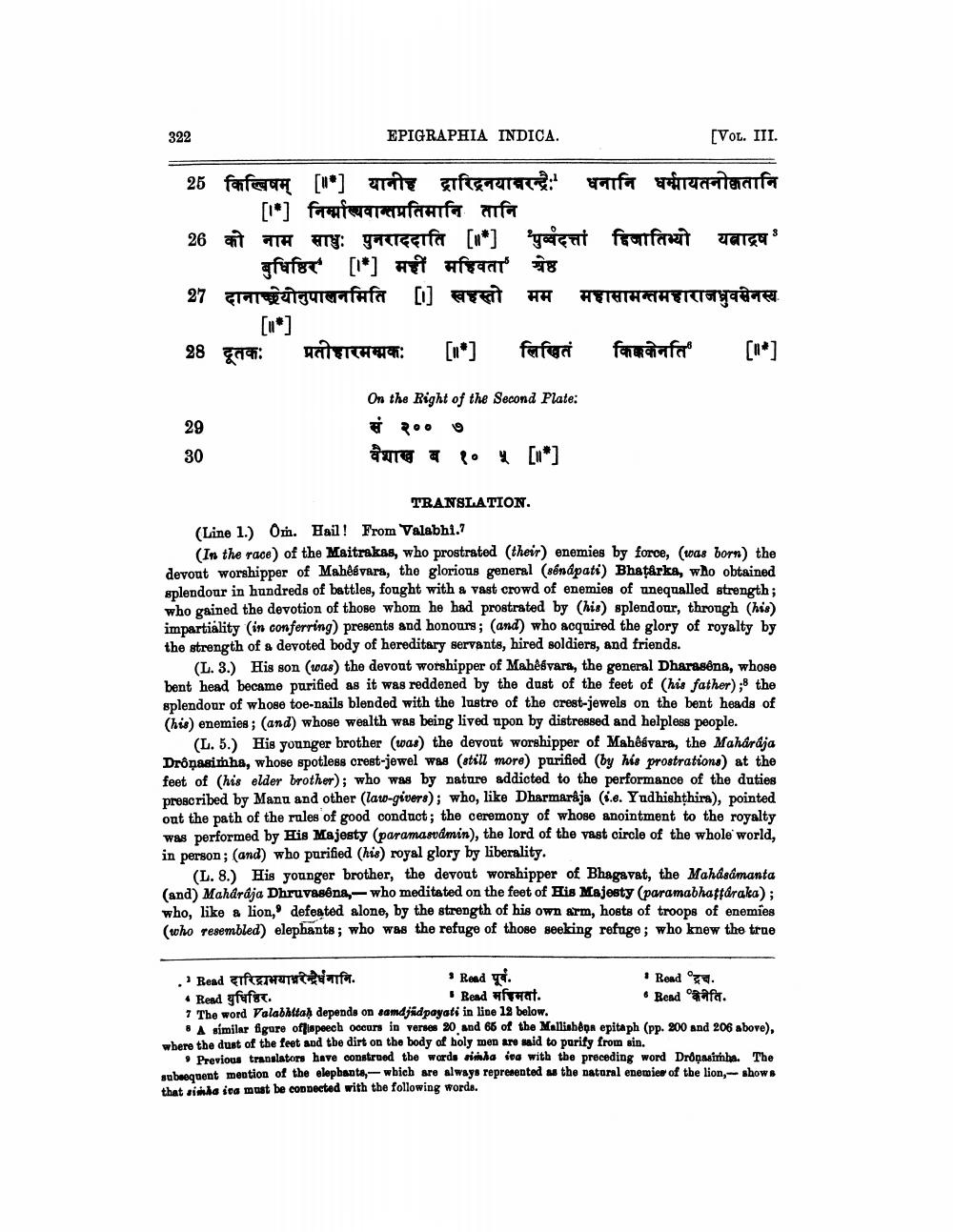________________
322
EPIGRAPHIA INDICA.
[VOL. III.
25 किल्विषम् [१] यानीह दारिद्रनयावरन्द्र: धनानि धमायतनोकतानि
[1] forcufarufatufa aifa 26 H y: greeifa [**] great frontfort agus
grafet [l*] HET Afraai 18 27 दानाच्छ्योनुपालनमिति ] स्वहस्तो मम महासामन्तमहाराजध्रुवसेनस्य
28 gara:
ultra*:
[n*)
fafuni
fanatafa
[v*]
On the Right of the Second Plate: सं २००७ are a fou [*]
TRANSLATION. (Line 1.) Om. Hail! From Valabh1.7
(In the race) of the Maitrakas, who prostrated (their) enemies by force, (was born) the devout worshipper of Mahéévara, the glorious general (sendpati) Bhatarka, who obtained splendoar in hundreds of battles, fought with a vast crowd of enemies of unequalled strength; who gained the devotion of those whom he had prostrated by (his) splendour, through his) impartiality (in conferring) presents and honours; (and) who acquired the glory of royalty by the strength of a devoted body of hereditary servants, hired soldiers, and friends.
(L. 3.) His son was the devout worshipper of Mahesvara, the general Dharasóna, whose bent head became purified as it was reddened by the dust of the feet of (his father) ;8 the splendour of whose toe-nails blended with the lustre of the crest-jewels on the bent heads of (his) enemies; (and) whose wealth was being lived upon by distressed and helpless people.
(L.5.) His younger brother (was) the devont worshipper of Mahobvara, the Maharaja Drônasimha, whose spotless crest-jewel was (still more) purified by his prostrations at the feet of (his elder brother); who was by nature addicted to the performance of the duties prescribed by Manu and other (law-givers); who, like Dharmaraja (.e. Yudhishthira), pointed out the path of the rules of good conduct; the ceremony of whose anointment to the royalty was performed by His Majesty (paramasvamin), the lord of the vast circle of the whole world, in person ; (and) who purified (his) royal glory by liberality.
(L. 8.) His younger brother, the devout worshipper of Bhagavat, the Mahåsamanta (and) Maharaja Dhruvasena, who meditated on the feet of His Majesty (paramabhaffäraka); who, like a lion, defeated alone, by the strength of his own arm, hosts of troops of enemies (who resembled) elephants; who was the refuge of those seeking refuge; who know the true
. Read fortun a
. Read .
* Read . • Read युधिष्ठिर.
- Read महिमा .
• Read afa. 7 The word Valabatah depends on samdjfidpayati in line 12 below.
& similar figure of speech occurs in verses 20 and 66 of the Mallia on epitaph (pp. 200 and 206 above), where the dust of the feet and tbe dirt on the body of holy men are said to purity from sin.
Previous translators have construed the words sinuha ina with the preceding word Drópasitha. The subregbent mention of the elephants, which are always represented as the natural enemies of the lion shows that simha ina must be connected with the following worde.




